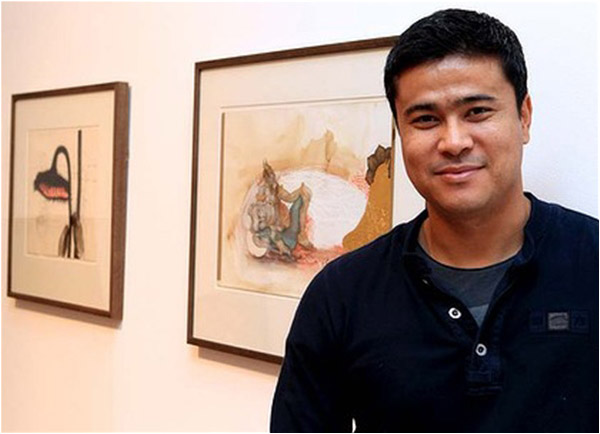MAX BABRI
Clinical Hypnotherapist who heals and the Industrial/Organizational Psychologist who redefines!
Writes: Tazyeen Anjum
“How about looking at the industry from the spiritual side of things, Tazyeen?î he asked me. I felt slightly bewildered. I do know Max has a marked ability to maximize on potential and concepts both, but this was new! Spiritual side to business? Wasn’t business discussed only in terms of profit and loss? What is he talking about? But then again, I was destined to learn something new – like each time I met this 65 years old guru of human resources, with silky, long grey hair, and the kindest of eyes I’ve looked into. Max is largely known for his therapeutic skills, but I believe, in essence and all truth, he is only an immaculately practical and practicing human being, sharing his wisdom and knowledge with whoever gets touched by his words, actions, and life, and teaching them to do exactly the same. His worldly wisdom, academic knowledge, and influential role in the business community for human resources and psychology seem blasphemously mundane in comparison to his core traits of undeniable kindness and towering truthfulness. And we all know, what reshapes and initiates change is an honest thought communicated to us kindly. Maxís advice can be a complete guide to revolution for smart business owners based on justice in favour of social equality. Sir Francis Bacon once said, ìSome books are to be tasted, others to be swallowed, and some few to be chewed and digested: that is, some books are to be read only in parts, others to be read, but not curiously, and some few to be read wholly, and with diligence and attention.î Maxís words, for sure, have the power to initiate some useful diligence.
After all, many of us do not ponder over some challenging questions anymore, such as, ‘What is the purpose of business?’
‘What is profit and why profit?’
‘Who are the beneficiaries of a business?’
‘Where is the soul of the business residing?’
Let’s find the answers from the man whose life is his message. ‘Saying and doing what is right, and being pro-people is something that is important to me. I believe either one is pro-people and giving, or parasitical and accumulating,’ said Max, concluding on the subjects of reshaping the industry through smart leadership. A series of discussions made me evaluate the existing business pattern, and I discovered that many businesses have the potential to become self-serving and exploitative if not kept on track with a well-thought-out plan.
There must be a way forward! Businesses can surely be transformed to improve quality of life of people and serve humanity, and yet remain sustainable and profitable. There has always been hope! And till the voice of reason is being spoken, there is room for reasonable action and improvement. His thoughts resonate the idea of power corrupts, and absolute power corrupts absolutely in my mind ñ something we all know, but still hunger after in our infinite near-sightedness. As per Maxís perspective, ìOne increases their power by sharing it, rather than accumulating and hoarding it! A larger number of powerful people is better than few very powerful ones.î The idea of collective growth resulting in leadership at all levels emerges from here, as opposed to the wellbeing of some powerful individuals, widely rampant in the current state of affairs. Letís put a reality check there! In Maxís words, ìNormally, the powerful have always wanted to perpetuate their strength by various means, being less thoughtful of othersí rights – hence disempowering others. To me, power is about equality, and the capacity to exercise choices. A judicious and more equitable distribution of resources empowers the world and its citizens, where more people are able to exercise their choices.î
This clarity of thought does not come easily ñ it is cultivated with well-guided formative years that resulted in actions, as evident in Maxís life and words. Born to Saeed-ud-Din and Khursheed Akhtar in 1951, Max is the only son to his parents, along with a three years younger sister, Khalida. Maqbool Babri completed his Masters in Clinical Psychology from the prestigious Government College, Lahore in 1973, and added value to his knowledge of psychology through the progressive degrees of Business Studies and Psychology from the University of Stockholm and University of LuleÂ, Sweden in 1982-84. He later acquired a Certification in Clinical Hypnotherapy from California, United States of America in 1998. The man has not only carved a genuinely well-respected living for himself and his Swedish wife, Majbritt, but has also been vocal and honest about his expert organic views on the working of the industry. ìI come from a humble background with a tremendous faith to carve out my own living. I have always believed I could take some bold career decisions, as I did not reduce my choices out of any fear or concern for the future, and hence, did not have to conform to systems. I made my own choices. Teaching was my passion, so I gave up a job in advertising, which was paying me Rs. 1,500 back in 1975, to have a chance to teach the subject of Clinical Psychology for Rs. 550 at Punjab Universityís Department of Applied Psychology. People do not allow themselves to make bold decisions like these anymore, as they may lack faith ñ it emerges possibly from their lack of security in the abundance that nature and the Creator has in store for us. This fear gives birth to hoarding, and the unnecessary accumulation of both wealth and commodities. Even some of the most terrible businesses have been found on the principle of hoarding.î
Maxís understanding of the industry does not come from observation or experience of the Pakistani market alone. His work has been acknowledged in developed societies like Sweden, where he was part of a programme called Ergonomics of Developing Countries. The programme included more than twelve nations, and was initiated in 1983. Interestingly, this was when he was welcomed with open arms by an international university, while The University of the Punjab considered him undesirable because of his liberal and progressive views. Sadly, we have the same issues at many places even today.
In a conversation with AgayBarho!, Max expands on our theory of moving on in diverse ways, using intellect for the best, and enacting the noblest. He takes us onto a soul-touching road of organic and ethical reshaping of the industry, and terms it ëspiritualí. Following thoughts on the new business order might strike as being dauntingly different, but when the intent is purified, and the principles redefined, streamlining the evolution gets easier. His words help us review the condition of the world, raise a lot of whys, and find answers to a lot of hows.
The world is in a bad shape. Letís swim against the tide, and not go with the flow. Letís create the flow and relearn, with the help of Maxís advice on the new business order that demands a new leadership who will shun exploitation and dehumanization of productivity partners, and recognizes that there is no growth possible if everyone involved is not a beneficiary of enhanced productivity and growth. Yes, a new smart leadership will create a new business order that is sustainable, re-establishing the dignity of the productivity partners, where employees take pride in their workmanship and their contributions.
THE NEW BUSINESS ORDER
There is an opportunity here, and AgayBarho! is convinced that there is a bright future ahead for the industry with rapidly improving communication, awareness and desire to excel. Interestingly, we can carve out the industrial psychologistís thoughts on the future reshaping of the industry, in the following eleven clauses:
- The modern business and new leadership will certainly be reshaping the business and industrial environment for all-inclusive growth based sustainability;
- Values, rules, and regulations will be jointly evolved and religiously practiced by everyone, irrespective of positions and/or titles;
- The products and services will be designed incorporating the aspirations and expectations of the customers and end-users;
- Downward and upward integrations will be strengthened to incorporate supply chain and distribution networks as important partners into the scheme of business;
- People and their quality of life will be central in establishing the purpose of business and how it will be run;
- The business will use modern tools and technologies for evolving innovative and creative solutions through research, development, and experimentation;
- New businesses will be a lot more satisfying holistically, as they will be spiritually connected, favouring judicious distribution of resources, improved working conditions and environment, and enhanced participation of the productivity partners [employees];
- Employee engagement and involvement in decision making will help evolve the workflow and production systemsí integration;
- The new leadership will encourage, and create space for its people to embrace entrepreneurship and risk-taking in further strengthening businesses;
- The modern business will ensure that ownership of tasks, activities, and processes is seamlessly recognized and accepted;
- The business of future will not need to pretend that they are a great company; they will be great companies in their soul, spirit, and body.
How interesting! Just those guidelines bring a burst of energy, mixed with a sense of integrity and an entitlement to happiness. As a nation, in our struggle for survival, which might be a lot self-created, we have successfully forgotten how to take pride in our own choices. It leaves us unhappy, to say the least. The world and our lifetimes have a lot to offer. Letís not get caught up in the rat race of survival of the fittest, and make those choices now that lead us into a smarter, healthier, and happier society. Reshaping the industry and its conditions, which is home to the most talented powerhouses of our country, will be an educated way to address the issue.
ìBusinesses can be based on higher goals, providing a quality of life which is more worthy of all stakeholders involved, i.e. the customers, employees, and shareholders, Max expressed. However, when it is aimed solely at producing surplus and stashing it in banks, both here and in offshore companies, then the money is being taken out of circulation, and poverty begins to expand. In my view, the purpose of surplus is to redeploy it into expanding the business, hence, employing even more people, improving the quality of products, and creating efficiency by enhancing the use of technology. Isnít hoarding of any commodity, including wealth, an undesirable act? Spiritually too?
Hasnít the world come to enough destruction as a result of the desire to hoard power? Isnít it time to stop and rethink? Where have we gone so wrong that, while we wish to build huge castles and monuments for ourselves, we achieve our desires through digging and mining our own collective foundations? How hollow could we become? Instead of developing sustainable projects that ensure collective wellbeing, we continue to pollute the public wealth while building our personal water purification plants. Is this disparity the corner stone of the spirituality that we are aligned to? Is this the result of smart and prudent business leadership controlled and managed by a handful of individuals? According to the psychologistís experiences, As human beings, we are responsible for each other, and are actually destined to take others along! AgayBarho! strongly believes Maxís words carry profound wisdom, urging us to recognize the purpose of our lives, and a sustainable future for humanity. Max propounds, Each one of us blessed with the gifts that nature has bestowed upon us is responsible for the ones who may not have received the same. While he thinks, The purpose of modern business is to improve quality of life, we believe that human intelligence, in the lust for power and wealth, has been woefully tricked, and has doomed humanity to think more in terms of personal benefits, at the cost of perhaps collective ones.
We missed on recognizing that our loved onesí and our own quality of life cannot be enhanced without enhancing the quality of the community we live with. To reshape the industry, ìWe must focus on the collective benefits of the community rather than just parochial and personal benefits.î How?
ìThe surplus that a business generates MUST be deployed in further expanding the business, creating new job opportunities and producing even more useful products with enhanced quality and great value for money, instead of it being stashed in banks fr personal gain. Doing the latter makes everybody poorer, because the lesser the money is in circulation, the more poverty it promises. It takes us away from the true purpose of business, which is to serve humanity, and improve quality of life.î And itís not like his words are profound and idealistic, with no touch of realism to them! Max, with his passionately resonating voice, immediately hurried to mention Hamdard Dawakhaana and Abdul Sattar Edhiís work. ìHamdard Dawakhaana is a fantastic example. Hakeem Saeed Sahib did a fabulous job with it: a trusted, organic way of healing that is accessible to all. Isnít that what health businesses should be all about? Edhi Sahib founded an organization with the purpose to serve humanity. It employs a huge number of people all over Pakistan and elsewhere. They are so respected and loved by their constituents that they never have to think about the sustainability or the financial viability of their business model.î Hakeem Saeed and Edhi Sahib really never did think about the financial viability of their organization. Similarly, Richard Branson of Virgin Airlines has built his organization around the idea of providing affordable air travel for customers, a non-discriminatory work environment to his employees, and making sure various other businesses stem out of the core! They have always focused on serving humanity, and have run soul-touching solutions for the less privileged in our society. Maxís words of local, creative solutions come home now.
He adds, ìAn ethical business would mean that you do your best to improve the quality of life of everybody involved, and especially those who are most vulnerable.î So if it isnít being practiced in the true spirit, then what exactly is at play? Injustice, or a lack of equitable sharing of surplus, and a denial of dignity and pride that a productivity partner is entitled to?
ON INJUSTICE
ìNow, when we deviate from this spiritual aspect of business, and judicious recognition of contributions as well as sharing of surplus, we tend to become exploitative. Businesses for their profitability sometimes tend to create a supply-demand disparity, playing with prices and encouraging hoarding. This is aimed at exploiting the consumer, and accruing unethical advantages. Furthermore, facilitating unemployment through use of child and contract labour, the businesses tend to suppress fair wage standards, hence downgrading salaries.î Max sums up the counter-productive rules largely at play, not easy to ignore in todayís day and age, where, he adds, ìIt is tragic that we still use individualsí muscle power instead of their brainpower, while the muscle power is limited, and brainpower is abundant. If the developing world continues to focus on the physical labour of an employee rather than their decision making power, they will just be recognized as a nation with cheap labour rather than a country with a highly qualified, talented and disciplined workforce. Thatís where progressive businesses have been successful. They have been able to use the best assets of their resources, i.e. the man decides and operates, and the machine carries the burden and does the hard work.î Time to reshape, and gain our pride and respect that we deserve as a smart and hard-working nation!
He points at the developed world where their trade unions ìHave ensured that workersí working conditions and environment must become more and more humane and worthy, so they have guaranteed that all their sweatshops and harsh working conditions get exported to the so-called developing countries.î Again, not an ethical step! The solution is perhaps in mechanizing the cumbersome work through machines, as Max earlier stated. Itís a fact when he says, ìThe high-street shops in Paris, Stockholm, New York, and Milan sell high-end apparels with exorbitant profits, while the poor working women continue to toil away in undesirable working conditions without a fair wage. I believe it is disrespectful that we push people to work in conditions and postures that is detrimental to their physical and musculoskeletal health.î The smart leadership of tomorrow must be working on structures which position Pakistan as a nation leading industrial units, packed with human resource who are working on judicious grounds, enjoying fair reward, and leading inspirational lives.
LEADERSHIP
As Max candidly proposed on the actual use of surplus, he crisply shared the qualities of the sort of leadership which can help achieve that dream of equality based on modernizing and reshaping the industry and its leadership. As per him, ìHumility is a great leadership quality, and as leaders grow, I would urge them to adopt even more humbleness, and have humility in their demeanour, because leading means leveraging.î Here, he goes on to destroy the minaret of leadership that we have carved so meticulously with a hundred pounds of ego, clanking gold chains of pride, and an endless drizzle of slavery. Opposite to what is largely practiced, for Max, ìLeading does not mean whipping people, and leveraging comes when people respect their supervisors, and are inspired by them instead of being driven through fear. Leadership is an extremely interesting phenomenon. It is following and practicing rules, regulations, and values more than everyone else. It is leading by example and inspiration. A great leader must be empathetic, humble, and competent. He or she must have the capacity to acknowledge mistakes openly and frankly. Most of all, he or she should be able to represent the best interests of the organization and its people, in front of the board.î
He further states, ìLeadership is an attitude. It is not a position, title, or the shades of grey hair. It is an attitude that reflects that you are thinking beyond yourself to generate happiness, joy, and an improved quality of life for everyone around you too! When it is an attitude, then everybody can display leadership, and everybody can be a leader. The whole idea of leadership is to produce even more leaders. Irrespective of job description, and the type of work one does in an organization, each employee deserves to be respected and appreciated for the contributions they make. They may have different assignments in which they choose to be leaders.î We believe productivity partners [employees], would want to make a note of that as much as employers. Itís leadership that brings about ownership, and not vice versa. A self-esteem challenge also inhibits an individual from exhibiting leadership skills. Time to shed that! Be bold; take educated decisions and own them. Enjoy the success and learn from the mistakes. Make life less complicated. ìPartnership means shunning exploitation and unnecessary agitation, and arriving at jointly evolved goals that flow into improving the quality of life for everyone.î
WAY FORWARD
Max’s spiritual view on the reshaping of industry through smart leadership stands to reason, and challenges the selfishness and greed that has slowly crept into our collective subconscious. AgayBarho! truly believes that to move towards a more peaceful world, we require a more just world, and disrupting modern economics with the rules of equality might just be the key. Isnít it divine? Doesnít help always come from the divine? Letís trust that help, and invest in our future generations. In the hypnotherapistís words, ìThe modern parent is urged to strengthen the self-esteem of todayís children by encouraging, appreciating, and admiring them, allowing them to question, facilitating a spirit of enquiry, and challenging them to explore the purpose and meaning of life. This will surely connect them to the spiritual side of living and working, urging them to focus on collective good instead of just personal glory.î
Max visualizes that the future generations will become a fountainhead of values and ethics, having consideration for othersí integrity and intellectual honesty. ìOur educational institutions have a role clearly cut out for them: visualizing and describing how their products will look like, what kind of citizens their produce would be, and what is it that the educational institutions would want to do to ensure that their produce meets the expectations of our countryís future.î
Max insists that it is important that we recognize that we are in this world to give ñ give happiness, joy, encouragement, love, support, and our very best effort; and most of all, forgive others and ourselves. This will keep us happy and healthy. Summing up the discussion, Max leaves us with something to continuously work on, “The moment we begin to focus that we’re here to take, we become sad and sick, both mentally and physically. Let yourself and your children realize that we are here to give… give unconditionally.“





